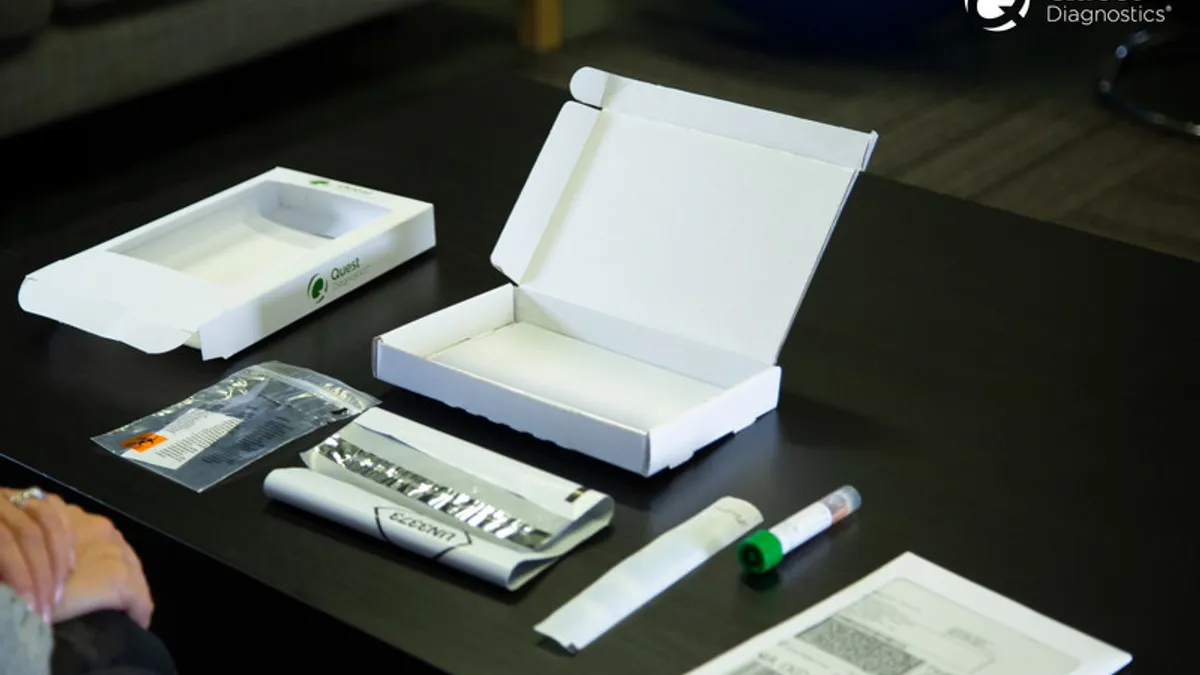Dive Brief:
-
Quest Diagnostics has become the first company to receive emergency use authorization for a test that diagnoses COVID-19 and influenza from samples collected at home.
-
The EUA filing leveraged human usability studies Quest ran on its COVID-19 home collection kit and existing data on a dual coronavirus-flu test that runs on Roche’s cobas systems. Quest is using Roche’s test and instrument, which received EUA from FDA in September.
-
FDA said Quest's at-home spin on Roche's test will enable people with unknown respiratory ailments to quarantine but still receive timely information on the nature of their illnesses.
Dive Insight:
The prospect of two respiratory diseases that cause similar symptoms, but have different outcomes and treatment pathways, circulating this winter has been a source of concern since it became clear the coronavirus would still be a public health crisis into 2021 as the flu season reaches its peak. BioFire Diagnostics and Qiagen responded to those concerns early in the pandemic by securing EUAs for combination tests.
Since then, FDA has published data showing the Qiagen panel has a higher limit of detection (LoD) than the vast majority of pure COVID-19 tests. Biofire’s respiratory panel has a lower LoD than Qiagen's test but is still less sensitive than many kits that only test for the coronavirus.
Roche's cobas kit raised the bar for combination offerings, achieving a LoD comparable to those of many established coronavirus tests, including the Swiss company’s own offering. Now, Quest is set to enable people to access the test without leaving their home.
The EUA is built on an application that combines existing data from Quest and Roche. Quest is using the same instructions for use that FDA okayed for the collection of COVID-19 samples in July. That enabled Quest to secure an EUA for its combination test without running a new usability study.
Similarly, Quest, with the agreement of Roche, relied on existing data on the cobas kit for the clinical evaluation section of its EUA. Roche received emergency authorization for the kit by linking the test to positive and negative percent agreements of close to 100% for the coronavirus and two types of influenza virus. Quest’s offering is performed using the Roche test on instruments made by the Swiss company.
FDA Commissioner Stephen Hahn framed the EUA as a boost to the U.S. response to COVID-19.
"Combination tests that are authorized for use with home-collected samples can be used to get answers to Americans faster, in the comfort and relative safety of their home, which allows patients to continue to quarantine while awaiting results. This efficiency can go a long way to providing timely information for those sick with an unknown respiratory ailment," Hahn said in a written statement.
However, the timeliness of COVID-19 testing results in general is being negatively affected by the recent rise in cases. Late last month, Quest said the average turnaround time for molecular diagnostic tests was then two to three days, up from two days earlier in the month, due the nationwide surge in coronavirus cases. At-home sample collection adds shipping time to the process, although the need to return kits on the day they arrive could help minimize delays.












